The Wellbeing of Patients -Commentary on “Music does not Alter Anxiety in Patients with Suspected Lung Cancer Undergoing Bronchoscopy: A Randomised Controlled Trial” - European ClinicalRespiratory Journal-Juniper Publishers
Juniper Publishers-Journal of Anesthesia
Commentary
Besides ensuring a high diagnostic yield and safety
through bronchoscopy it is the opinion of the authors that it is
important to ensure the wellbeing of patients. That was our focus in the
study published in European Clinical Respiratory Journal with the title
"Music does not alter anxiety in patients with suspected lung cancer
undergoing bronchoscopy: a randomised controlled trial".
Patients undergoing different procedures in hospital
settings may fear the anesthesia, surgical intervention and outcomes.
Anxiety can determine increased intraoperative anesthetic requirement
and also lead to a lower level of satisfaction with the treatment [1].
There has been a growing interest in the possible influences of anxiety
on the course and outcomes of treatments, as well as in the study of
anxiety-reducing interventions.
The thought of bronchoscopy, which is a common
procedure in diagnosing lung cancer, may also trigger anxiety. Patients
exhibit, for example, fear of breathlessness, pain, loss of control, and
fear of the unknown [2].
Anxiety can be relieved with sedation [3-5].
At the outpatient clinic at Bispebjerg Hospital patients undergoing
bronchoscopy are mainly sedated with Midazolam as a bolus injection. If
an EBUS (Endobronchial Ultrasound) is expected, or the patient does not
seem sufficiently sedated, this is obtained with Fentanyl, also as bolus
injection. Figures 1-3
visualise the administration of Midazolam and Fentanyl to the patients
included in the study. An increased higher dose of sedatives leads to an
increased risk of respiratory depression [6-9].
A reduced lung function is common in patients undergoing bronchoscopy
to detect lung cancer. Patients included in our study had a mean FEV1 of
75.0% (SD 22.3) of predicted, and in the excluded patients the mean
FEV1 was even lower (66.4% (SD 21.67)). Therefore sedatives must be
given with caution, and it is of interest to investigate other means of
relieving anxiety, fear and discomfort.
Music has been investigated earlier in relation to
bronchoscopy, but with different outcomes, music genres, audio devices
and dosage, and with contradictory findings [10-13]. Same findings apply to other invasive procedures [14,15].
We hypothesized, though, that "MusiCure-music as medicine" played
before and during bronchoscopy might relieve anxiety for patients
undergoing bronchoscopy to detect lung cancer. We chose "MusiCure-music
as medicine" because it has been investigated before, and the composer
has designed the music to be calming and soothing and promotes his music
as medicine. Studies investigating MusiCure have mostly been done in
connection with cardiac surgery and postoperatively. These studies have
different outcomes, but most of them favour MusiCure [16-23].
Our primary outcome was Spielberger's State-Trait
Anxiety Inventory (STAI). The STAI-State scores at the time of admission
were similar in the two groups, in our study, whereas a significant
difference in the STAI-State score (median (IQR) 35 (18) versus 43 (25);
p = 0.03, r = -0.18) was observed between the music and the control
group prior to bronchoscopy, with lower scores in the music group, but a
multiple regression analysis revealed that treatment group was not a
significant predictor of STAI- State level in the operating theatre when
adjusting for gender and baseline anxiety.
This brought us to the conclusion that MusiCure
played for 10 minutes before bronchoscopy does not alter anxiety and, in
addition, that it is very important to look out for confounders when
researching the effect of music on anxiety.
Administering music before and during bronchoscopy did not reduce the amount of sedatives neither (Table 1).
Though we could not conclude that music could relieve the anxiety of
patients who have to undergo bronchoscopy, or reduce amount of
administered sedatives, we saw a highly significant difference between
the music and the no-music group rating their experience of sound in the
operating theatre (Figure 4).
So administering musicto patients undergoing bronchoscopy might not
relieve anxiety, but it enhances the comfort of patients undergoing
bronchoscopy.
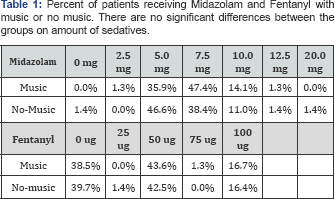
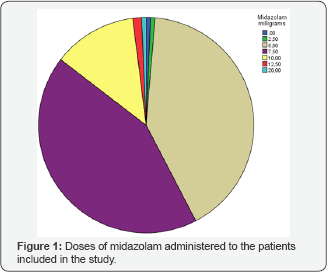
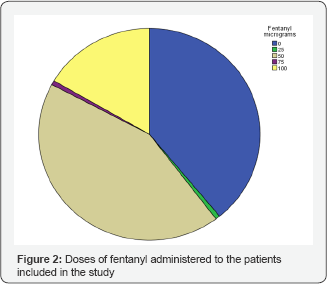
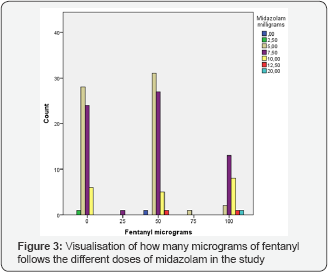
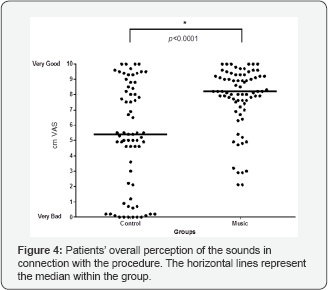
For more articles in Journal of Anesthesia
& Intensive Care Medicine please click on:
https://juniperpublishers.com/jaicm/index.php
https://juniperpublishers.com/jaicm/index.php
Comments
Post a Comment